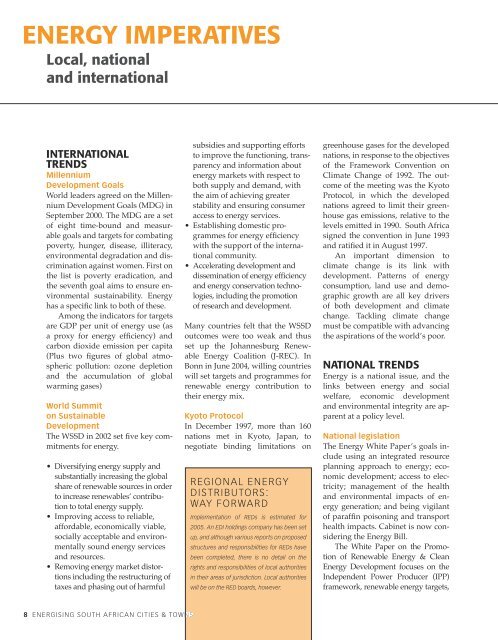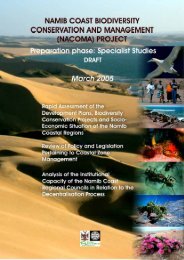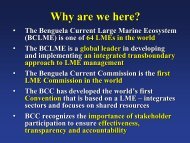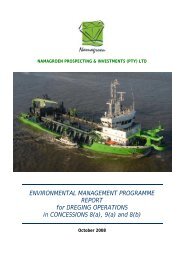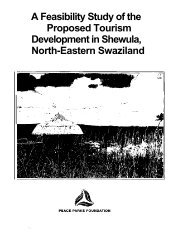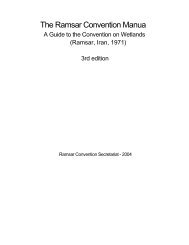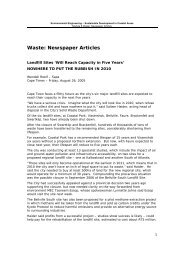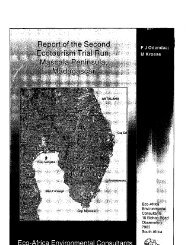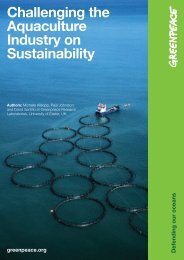Energising South African Cities & Towns - City Energy Support Unit
Energising South African Cities & Towns - City Energy Support Unit
Energising South African Cities & Towns - City Energy Support Unit
You also want an ePaper? Increase the reach of your titles
YUMPU automatically turns print PDFs into web optimized ePapers that Google loves.
ENERGY IMPERATIVESLocal, nationaland internationalINTERNATIONALTRENDSMillenniumDevelopment GoalsWorld leaders agreed on the MillenniumDevelopment Goals (MDG) inSeptember 2000. The MDG are a setof eight time-bound and measurablegoals and targets for combatingpoverty, hunger, disease, illiteracy,environmental degradation and discriminationagainst women. First onthe list is poverty eradication, andthe seventh goal aims to ensure environmentalsustainability. <strong>Energy</strong>has a specific link to both of these.Among the indicators for targetsare GDP per unit of energy use (asa proxy for energy efficiency) andcarbon dioxide emission per capita(Plus two figures of global atmosphericpollution: ozone depletionand the accumulation of globalwarming gases)World Summiton SustainableDevelopmentThe WSSD in 2002 set five key commitmentsfor energy.• Diversifying energy supply andsubstantially increasing the globalshare of renewable sources in orderto increase renewables’ contributionto total energy supply.• Improving access to reliable,affordable, economically viable,socially acceptable and environmentallysound energy servicesand resources.• Removing energy market distortionsincluding the restructuring oftaxes and phasing out of harmfulsubsidies and supporting effortsto improve the functioning, transparencyand information aboutenergy markets with respect toboth supply and demand, withthe aim of achieving greaterstability and ensuring consumeraccess to energy services.• Establishing domestic programmesfor energy efficiencywith the support of the internationalcommunity.• Accelerating development anddissemination of energy efficiencyand energy conservation technologies,including the promotionof research and development.Many countries felt that the WSSDoutcomes were too weak and thusset up the Johannesburg Renewable<strong>Energy</strong> Coalition (J-REC). InBonn in June 2004, willing countrieswill set targets and programmes forrenewable energy contribution totheir energy mix.Kyoto ProtocolIn December 1997, more than 160nations met in Kyoto, Japan, tonegotiate binding limitations onREGIONAL ENERGYDISTRIBUTORS:WAY FORWARDImplementation of REDs is estimated for2005. An EDI holdings company has been setup, and although various reports on proposedstructures and responsibilities for REDs havebeen completed, there is no detail on therights and responsibilities of local authoritiesin their areas of jurisdiction. Local authoritieswill be on the RED boards, however.greenhouse gases for the developednations, in response to the objectivesof the Framework Convention onClimate Change of 1992. The outcomeof the meeting was the KyotoProtocol, in which the developednations agreed to limit their greenhousegas emissions, relative to thelevels emitted in 1990. <strong>South</strong> Africasigned the convention in June 1993and ratified it in August 1997.An important dimension toclimate change is its link withdevelopment. Patterns of energyconsumption, land use and demographicgrowth are all key driversof both development and climatechange. Tackling climate changemust be compatible with advancingthe aspirations of the world’s poor.NATIONAL TRENDS<strong>Energy</strong> is a national issue, and thelinks between energy and socialwelfare, economic developmentand environmental integrity are apparentat a policy level.National legislationThe <strong>Energy</strong> White Paper’s goals includeusing an integrated resourceplanning approach to energy; economicdevelopment; access to electricity;management of the healthand environmental impacts of energygeneration; and being vigilantof paraffin poisoning and transporthealth impacts. Cabinet is now consideringthe <strong>Energy</strong> Bill.The White Paper on the Promotionof Renewable <strong>Energy</strong> & Clean<strong>Energy</strong> Development focuses on theIndependent Power Producer (IPP)framework, renewable energy targets,8 ENERGISING SOUTH AFRICAN CITIES & TOWNS


